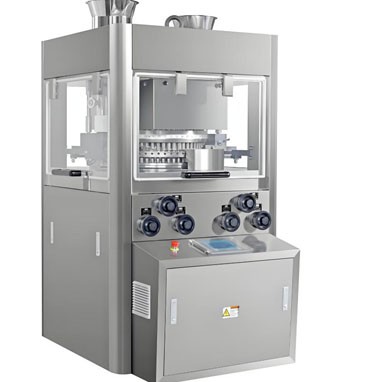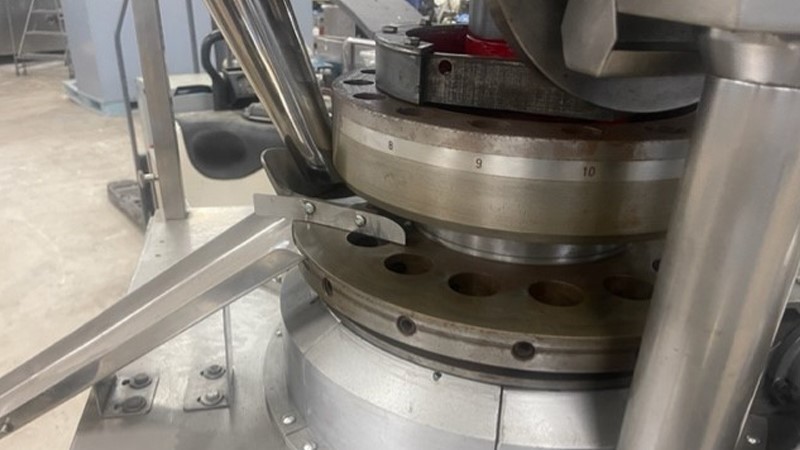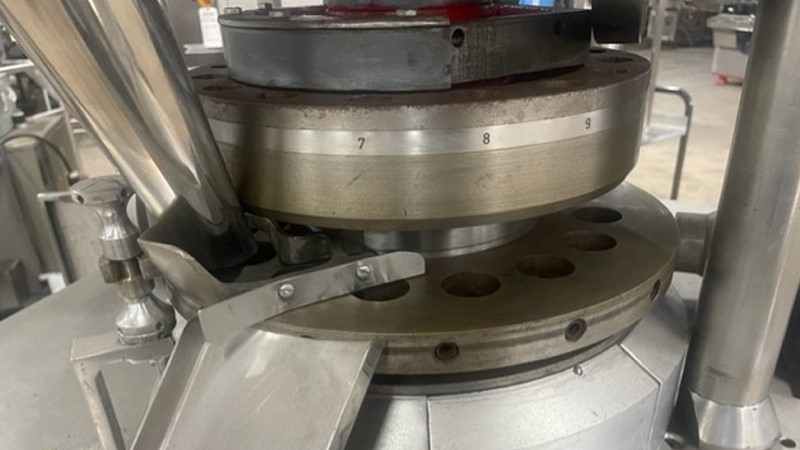How To Choose Lubricant For Rotary Tablet Press Machines?
May 30, 2025
Leave a message
Selecting the right lubricant for your rotary tablet press machine is crucial for maintaining optimal performance and extending the equipment's lifespan. This comprehensive guide will explore the best lubricant types, food-grade options, and essential selection criteria to ensure the smooth operation of your tablet press.
We provide rotary tablet press machine, please refer to the following website for detailed specifications and product information.
Product:https://www.achievechem.com/tablet-press-machines/rotary-tablet-press-machine.html

Rotary tablet press machine
The Rotary Tablet Press Machine is a high-speed mechanical device used to press various granular raw materials into round and shaped sheets, especially suitable for large-scale production in pharmaceutical, chemical, food and electronics industries. Our company chooses advanced alloy tool steel, heat treatment technology, and scientific testing methods to make various die customization.Our decades of experience in die production and manufacturing can meet the customization needs of users for various shapes.Customized molds can meet the needs of users, whether it is circular, irregular, shallow concave, deep concave, beveled edge, split punch, single punch, multi punch, chrome plated, or hard alloy in various forms of stamping dies.
What Type of Lubricant Works Best for Rotary Tablet Press Machines?
When it comes to lubricating rotary tablet press machines, not all lubricants are created equal. The ideal lubricant should possess specific properties to withstand the unique conditions present in tablet manufacturing processes.
High-performance synthetic lubricants are often the top choice for rotary tablet presses. These lubricants offer superior resistance to oxidation, thermal breakdown, and wear protection compared to conventional mineral oils. Synthetic lubricants maintain their viscosity under high temperatures and pressures, ensuring consistent lubrication throughout the machine's operation.
Some key characteristics to look for in a lubricant for rotary tablet presses include:
Low friction coefficient
Excellent thermal stability
High load-carrying capacity
Resistance to water washout
Compatibility with seals and other materials
Polyalphaolefin (PAO) based synthetic lubricants are particularly well-suited for rotary tablet presses. These lubricants offer exceptional thermal stability, low volatility, and excellent protection against wear and corrosion. They also have a wide operating temperature range, making them suitable for various tablet manufacturing conditions.
Another option to consider is perfluoropolyether (PFPE) lubricants. These specialized synthetic lubricants offer outstanding chemical inertness, making them ideal for applications where contamination is a concern. PFPE lubricants also provide excellent lubricity and thermal stability, even in extreme conditions.
It's important to note that the specific lubricant choice may vary depending on the model and manufacturer of your rotary tablet press. Always consult your equipment manual and lubricant supplier to ensure compatibility and optimal performance.
 |
 |
 |
Can You Use Food-Grade Lubricants in Rotary Tablet Press Machines?
In industries where product purity is paramount, such as pharmaceutical and food manufacturing, the use of food-grade lubricants in rotary tablet press machines is not just possible but often necessary. Food-grade lubricants are specially formulated to meet stringent safety standards and minimize the risk of contamination in case of incidental contact with the product.
When considering food-grade lubricants for your rotary tablet press, look for products that meet the following criteria:
NSF H1 certification: This designation indicates that the lubricant is safe for incidental food contact.
FDA compliance: Ensure the lubricant complies with FDA regulations for use in food processing equipment.
ISO 21469 certification: This standard addresses hygiene requirements for lubricants with incidental product contact.
Food-grade synthetic lubricants are available that offer both safety and high performance. These lubricants are typically based on synthetic base oils such as PAOs or esters, combined with food-grade additives to enhance their performance characteristics.
Some advantages of using food-grade lubricants in rotary tablet presses include:
Reduced risk of product contamination
Compliance with food safety regulations
Potential for extended lubrication intervals
Improved equipment cleanliness
It's worth noting that while food-grade lubricants are designed to be safe for incidental contact, they should still be used judiciously and by good manufacturing practices. Regular maintenance and proper lubricant application techniques are essential to minimize the risk of contamination.
When transitioning to food-grade lubricants, it's crucial to thoroughly clean and flush the rotary tablet press to remove any residual non-food-grade lubricants. This process ensures that no cross-contamination occurs and maintains the integrity of your food-grade lubrication system.
Lubricant Selection Criteria: Ensuring Smooth Rotary Tablet Press Operation
Choosing the right lubricant for your rotary tablet press machine involves considering various factors to ensure optimal performance and longevity of your equipment. Here are key criteria to keep in mind when selecting a lubricant:
Viscosity: The lubricant's viscosity should be appropriate for the operating conditions of your rotary tablet press. Consider factors such as operating temperature, speed, and load when selecting the viscosity grade.
Temperature Range: Choose a lubricant that can withstand the temperature extremes encountered during operation. Look for products with a wide operating temperature range to ensure consistent performance.
Compatibility: Ensure the lubricant is compatible with the materials used in your rotary tablet press, including seals, gaskets, and metal components. Incompatible lubricants can cause premature wear or degradation of these components.
Load-Carrying Capacity: The lubricant should have sufficient load-carrying capacity to protect high-pressure contact points in the rotary tablet press, such as bearings and gears.
Oxidation Resistance: Look for lubricants with high oxidation resistance to prevent the formation of harmful deposits and extend the lubricant's service life.
Water Resistance: In environments where water contamination is possible, choose a lubricant with good water separation properties to maintain its performance and protect against corrosion.
Additives: Consider lubricants with appropriate additives for enhanced performance, such as anti-wear agents, extreme pressure additives, and corrosion inhibitors.
Cleanliness: Opt for lubricants that promote cleanliness by minimizing deposit formation and facilitating easy cleaning of the rotary tablet press.
Environmental Impact: Consider environmentally friendly lubricants that are biodegradable and have low toxicity, especially if your operations prioritize sustainability.
Regulatory Compliance: Ensure the lubricant meets all relevant industry standards and regulatory requirements, particularly for pharmaceutical and food manufacturing applications.
When evaluating lubricants based on these criteria, it's beneficial to work closely with lubricant manufacturers or suppliers who can provide technical expertise and recommend products tailored to your specific rotary tablet press model and operating conditions.
Regular monitoring and analysis of lubricant performance can help optimize your lubrication strategy. Implementing oil analysis programs can provide valuable insights into lubricant condition, equipment wear, and potential contamination issues, allowing for proactive maintenance and lubrication adjustments.
It's also important to consider the overall cost-effectiveness of the lubricant. While premium synthetic lubricants may have a higher initial cost, they often provide better protection, longer service life, and reduced downtime, resulting in a lower total cost of ownership for your rotary tablet press operation.
Proper storage and handling of lubricants are crucial to maintain their effectiveness. Store lubricants in a clean, dry area away from extreme temperatures and contaminants. Use dedicated dispensing equipment to prevent cross-contamination and ensure accurate application of the lubricant to your rotary tablet press.
Training operators and maintenance personnel on proper lubrication procedures is essential for maximizing the benefits of your chosen lubricant. This includes understanding the correct application methods, relubrication intervals, and signs of potential lubrication-related issues.
By carefully considering these selection criteria and implementing best practices for lubrication management, you can significantly enhance the performance, reliability, and longevity of your rotary tablet press machine.
 |
 |
 |
Conclusion
Selecting the right lubricant for your rotary tablet press machine is a critical decision that can significantly impact your equipment's performance, longevity, and overall productivity. By considering factors such as lubricant type, food-grade requirements, and specific selection criteria, you can optimize your tablet manufacturing process and minimize downtime.
Are you looking for expert guidance on selecting the best lubricant for your rotary tablet press machine? ACHIEVE CHEM is here to help! As a trusted manufacturer of lab chemical equipment with multiple technical patents and certifications, including EU CE and ISO9001, we have the expertise to assist pharmaceutical companies, chemical manufacturers, biotechnology firms, and other industries in optimizing their tablet press operations. Contact us today at sales@achievechem.com to learn more about our solutions and how we can help improve your tablet manufacturing process.
References
1. Johnson, A. R., & Smith, B. L. (2019). Advances in Lubricant Technology for Pharmaceutical Manufacturing Equipment. Journal of Pharmaceutical Sciences, 108(5), 1652-1665.
2. Miller, C. D., & Thompson, E. F. (2020). Food-Grade Lubricants in Tablet Press Operations: A Comprehensive Review. International Journal of Pharmaceutics, 580, 119219.
3. Rodriguez, G. H., & Williams, K. P. (2018). Optimizing Rotary Tablet Press Performance through Proper Lubrication Strategies. Pharmaceutical Technology, 42(11), 38-45.
4. Chen, L., & Davis, R. T. (2021). Selection Criteria for High-Performance Lubricants in Pharmaceutical Equipment. Drug Development and Industrial Pharmacy, 47(3), 351-364.

